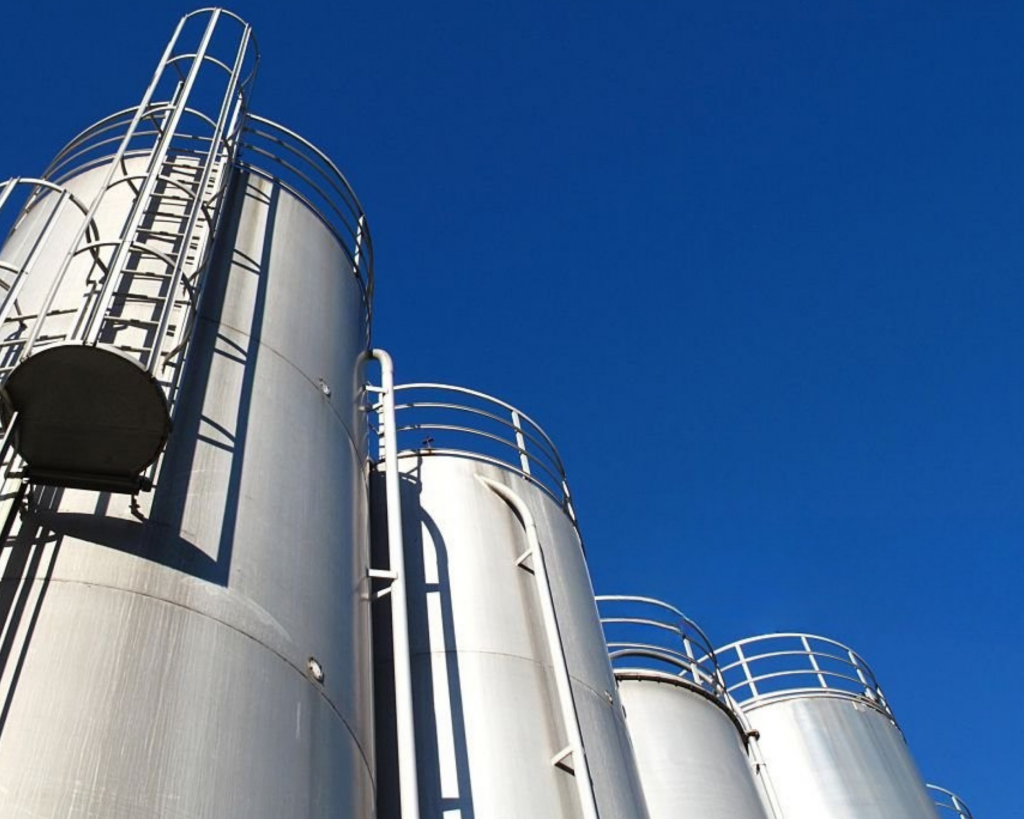What is a Stainless Silo?
A stainless silo is a durable metal tank, generally used in industrial production areas, that ensures the hygienic and safe storage of products in liquid or solid form. These silos allow products, especially in the food, chemical, and pharmaceutical sectors, to be stored without spoiling and unaffected by external factors.
Key Features of a Stainless Silo
Material Structure
Grade 304 or 316 stainless steel is generally used in the production of stainless silos. These materials are known for both their strong structure and their resistance to external factors.
Corrosion Resistance
A stainless silo is highly resistant to moisture, acidic environments, and chemicals. This allows it to be used for years and maintain its structure against external factors.
Hygienic Design
Hygiene is essential, especially in the food and pharmaceutical sectors. Thanks to their smooth inner surfaces, stainless silos do not retain bacteria and can be easily cleaned.
Types of Stainless Silos
Vertical Silos
They are generally preferred to save space. They provide high-volume storage.
Horizontal Silos
They are preferred in production areas with low ceilings. Cleaning and maintenance are easier.
Mobile Silos
With their portable structure, they are an ideal solution for short-term storage or when distribution to different areas is required.
Conical Bottom Silos
They facilitate the easy discharge of flowable materials. They are preferred for products like powder, flour, and granules.
Application Areas of Stainless Silos
Food Industry
They are used for the healthy and hygienic storage of food items such as flour, sugar, liquid oil, and milk.
Chemical and Pharmaceutical Industry
They are suitable for the safe storage of chemical substances and pharmaceutical raw materials. They are resistant to reactive materials.
Agriculture and Feed Industry
They ensure the storage of feed, grain, and other dry products, protecting them from moisture.
Industrial Production Areas
They are used for the pre- or post-process storage of various raw material types such as powder, liquid, and granules.
Advantages of Stainless Silos
Long-Lasting Use
Silos made of stainless steel operate trouble-free for years and require minimal maintenance.
Easy Cleaning and Maintenance
Thanks to their hygienic surface structure, cleaning procedures can be completed quickly and easily.
Sealing and Safety
Sealing is guaranteed with excellent welding and lid systems.
Aesthetic Appearance and Modern Structure
It adds elegance to industrial areas and reflects the professionalism of your brand.
The Quality Difference in Stainless Silo Production with Asinoks
Custom Designs for Customers
Asinoks develops special projects for each customer’s needs. Requests outside of standard dimensions are also met professionally.
Project Planning and Engineering Support
Technical support is provided from the project planning stage to the end of assembly. 3D drawings, capacity analyses, and detailed survey services are offered.
Certified Production in Compliance with Standards
All products are manufactured in accordance with international quality and safety standards.
On-Site Assembly and After-Sales Support
With on-site assembly and maintenance services throughout Turkey, we sell not just a product, but a service.
Things to Consider When Choosing a Stainless Silo
Properties of the Product to be Stored
Is the product liquid, powder, or granule? A different silo structure is required for each.
Capacity and Volume Requirement
A silo that is larger or smaller than your needs can create a disadvantage in terms of cost or efficiency.
Installation Area and Positioning
The area size and silo placement must be planned carefully.
Permits and Regulations
Legal approval processes for silos used in the food and chemical sectors should not be forgotten.
Factors Affecting Stainless Silo Prices
Raw Material Quality
Grade 304 or 316? The type of steel used directly affects the price.
Production Process and Labor
Detailed welding work, custom designs, and engineering details can increase the cost.
Extra Features and Automation Systems
Level indicators, mixing systems, and heating-cooling options are added to the price.
Common Mistakes and Things to Avoid
- Choosing products made from cheap materials
- Miscalculating the capacity
- Failing to plan the installation
- Inadequate cleaning and maintenance procedures
How to Get a Quote via asinoks.com?
- Visit www.asinoks.com.
- Go to the relevant product category.
- Fill out the “Get a Quote” form.
- Our expert team will contact you shortly.
Conclusion
Stainless silos form the backbone of the industry in terms of both hygiene and durability. If you are looking for a safe and long-lasting storage solution in the food, chemical, agricultural, and industrial sectors, it’s time to meet the expertise of Asinoks. Whether it’s a standard size or a special project… Asinoks offers solutions tailored to your needs.
FAQ (Frequently Asked Questions)
- How long does it take to produce a stainless silo?
It varies between 2 to 6 weeks depending on the size of the project. - Is extra space required for silo installation?
Yes, the suitability of the installation area is determined by a site survey. - What grade of stainless steel are Asinoks silos made from?
Generally, grade 304 and 316 stainless steel are preferred. - Can a mixing system be added inside the silo?
Yes, equipment such as mixers and level sensors can be integrated according to needs. - How is the cleaning process performed?
Thanks to its easy-to-clean design, hygiene is ensured through CIP systems or manual methods.


